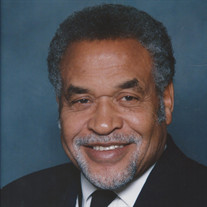

1932
Herbert
2016
Herbert Lenward Woods
February 12, 1932 — March 15, 2016
Herbert Lenward Woods was born in Westville, Illinois, on February 12, 1932, the 10th of 11 children into a family of a God-fearing Man. Like his father before him, Herbert Woods was internally powerful, bold, and he cut his own way in the world, on his terms and for his principles. Those principles included a profound commitment to family, a profound interpretation of the meaning of scripture, and a dedicated purpose to assist Black people and others living at the bottom of the economic and social justice ladder. He learned commitment to family from an early age, being born in the middle of the Great Depression. His mother died when he was just 3 years old – a painful absence that stayed with him, he often confessed – and the older siblings essentially had to help raise him since his father was working multiple jobs. He then did the same as a working teenager, and then by sending the bulk of his Army pay home to his father during the Korean War, to help pay for another’s college. Later, before he brought home his fiancé to meet his father he returned home to fix up and paint the family homestead. Later still, when his wife and mother of their five children, asked him to decide between his continued after-work leadership in the Civil Rights Movement –at its height in 1965-, his choice was clear and decisive for family. He had married well –to Constance Elaine Baugh and their partnership of 57 years raised five closely bonded children into adulthood, ¬¬¬ as well as thirteen grandchildren and six great-grandchildren, all with intricately woven intimacy for each other down the generations. Herbert Woods believed deeply that for individuals and families to be successful they needed a grounding in education and an adequate place to live: “ people need enough space for their families, space so that they can think clearly.” After Army service (rising to rank of Sargent) he earned his Bachelors Degree with departmental Honors from the University of Pittsburgh; followed by earning his Masters in Public Administration from Syracuse University. He then joined the Federal government in June 1960, taking a position in the field of public housing. His first intention had been to become a teacher, but with a growing family he instead pursued public service, with a first career being running public housing programs in Indianapolis and Chicago. He delved whole heartedly into the work with a mission orientation; quickly making it clear that his intent, the plans he submitted, the proposals he advocated, the arguments that he made, were entirely focused upon finding a way to improve the availability and quality of housing for the poor blacks and whites of the cities. For six years he would pursue this line of work, including a three year stint in the main Washington DC office. While in DC, beginning in 1963, Herbert Woods also committed himself to the active sword point of the Civil Rights Movement. For a two year period, he led the DC Chapter of C.O.R.E. (Congress Organized for Racial Equality), the long established direct action organization. CORE was the only specifically-designed biracial civil rights organization of its day, and he was very proud to have successfully sent teams of black couples and white couples into DC apartment complexes to expose racism, and thus enforce the integration of housing in the upper northwest quadrant of the nation’s capitol. Most significantly, Herbert Woods was one of the leaders in the Oval Office of the White House with President Johnson during the 1965 struggle to create the Voting Rights Act, and present at its signing on Aug. 6 of that year. That was also the year that his wife turned his attention back to his own 7-member family and its growing needs. His redirection was dramatic and complete. Within two years, he was representing the United States in Manila, the Philippines, serving in the State Department’s Agency for International Development (AID). He would be a Program Officer and then Program Director in three posts: in the Philippines, in Morocco in North Africa, and in Benin, in sub-saharan West Africa, serving for 2 -3 year terms each. He also served briefer terms across southern Asia and also ended his career heading the programs for three countries on the very tip of the West Africa. His specialty was economic development, the raison-d’etre of AID. It put him into the heart of improving the lives of the poor, into the lives of people in other countries at the bottom of the social just ladder, and at the bottom of the educational ladder as well. One of the many aspects of this work was his oversight of programs that provided American collegiate and professional education to young adults from the country where he was posted. For many years afterwards, he relished the occasional notes he would receive from those students he had helped find a way to improve themselves and their families. Herbert Woods, in loving partnership with his wife, Connie, achieved these varied accomplishments in an era when few Black people had the opportunity to do so, this being the era when official segregation was finally ended, but whose legacy persisted. Few African-American families have lived in Africa and in Asia; fewer families also remained close-knit despite the long periods and thousands of miles of separation that often occurred. Their faith was the source. His boldness and commitment to what he saw as the meaning of Scripture, drove him. He gravitated to Churches that had a commitment to active work to that end, considering Sunday church alone to not be adequate enough. Their home reflected their open heart: overseas, it was known that exhausted Peace Corps volunteers could find an oasis there, and local people from officials to security guards were welcome in the same manner. In fact, he would be invited to bring his family deep inside local communities for a meal, unlike other members of the embassy. In the United States, it was known that the Woods home was a welcoming one, and that many Sundays, and most Thanksgivings and Easters, would find a new guest or two, warmly received. In fact, their warmth radiated and for decades was perhaps the most common description of the home by those guests. Like his father before him, and like his children attempt after him, Herbert Woods lived by deeply rooted principles: from scripture, about close family ties, and for the uplift of those on the lower rungs of society’s ladders. He passed away on March 15, 2016. Let us celebrate a life well lived.
To send flowers or a memorial gift to the family of Herbert Lenward Woods please visit our Sympathy Store.
To order memorial trees or send flowers to the family in memory of Herbert Lenward Woods, please visit our flower store.
Service Schedule
Past Services
Visitation
Wednesday, March 23, 2016
10:00 - 11:00 am (Eastern time)
River of Life Church
Service
Wednesday, March 23, 2016
Starts at 11:00 am (Eastern time)
River of Life Church
Guestbook
Visits: 34
This site is protected by reCAPTCHA and the
Google Privacy Policy and Terms of Service apply.
Service map data © OpenStreetMap contributors



